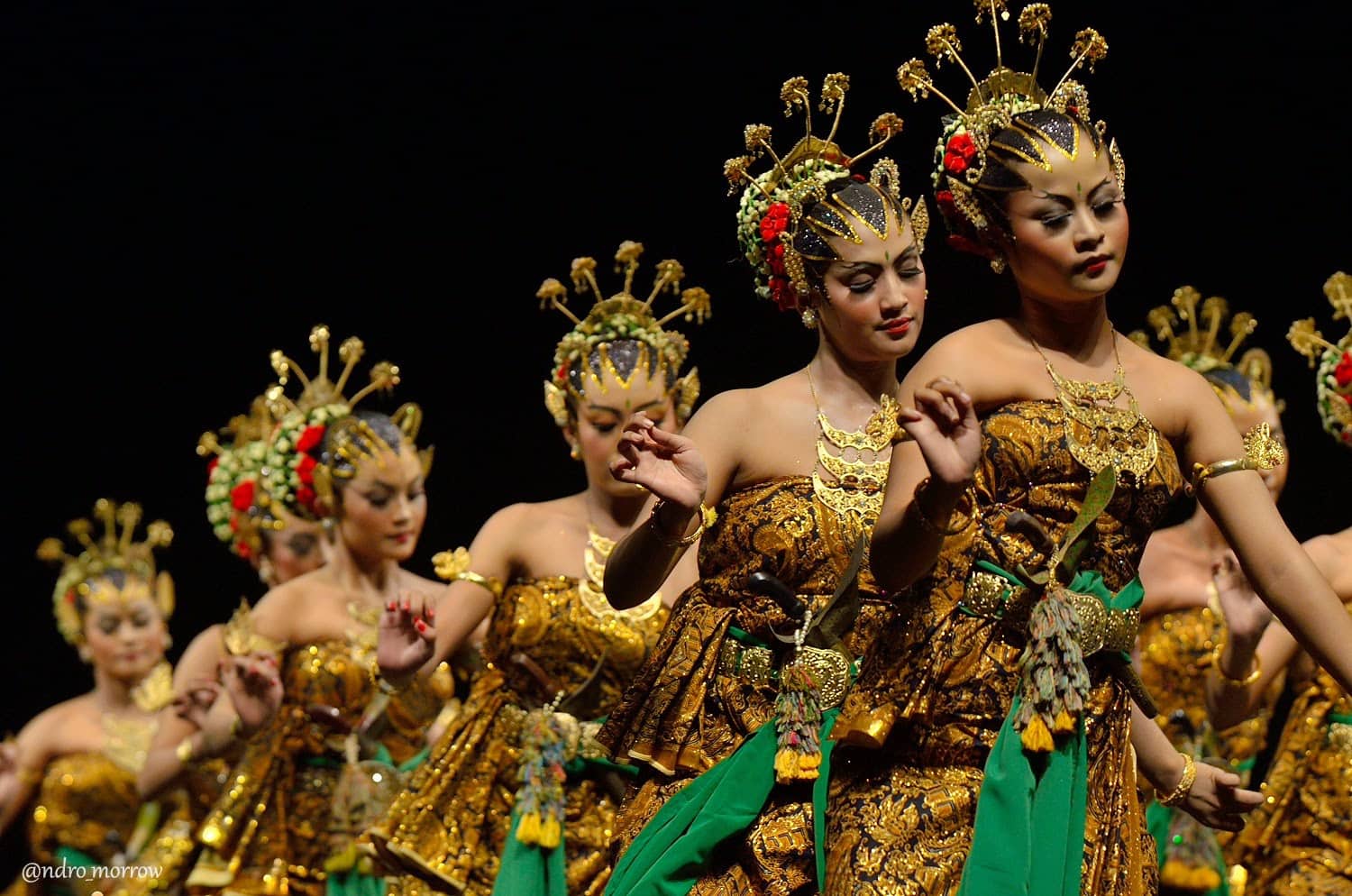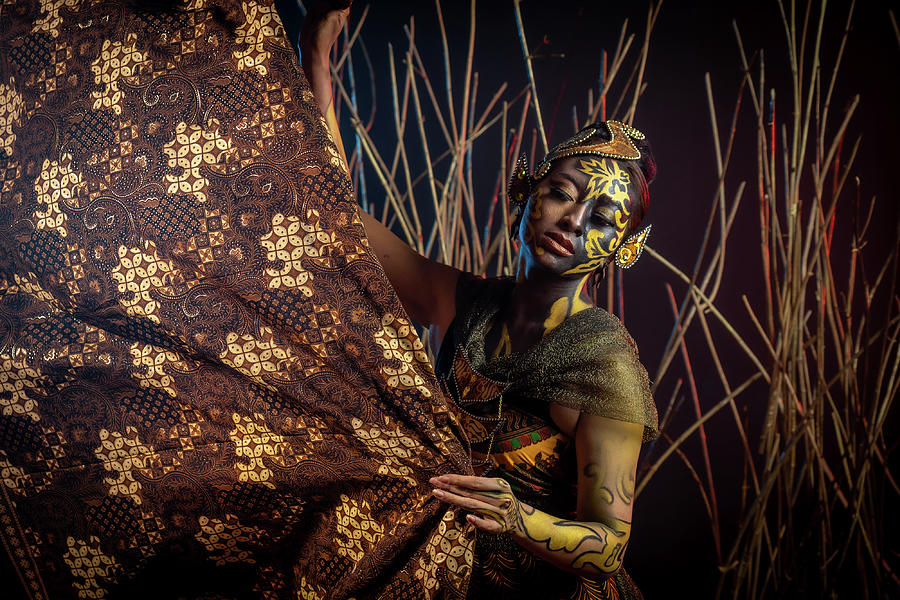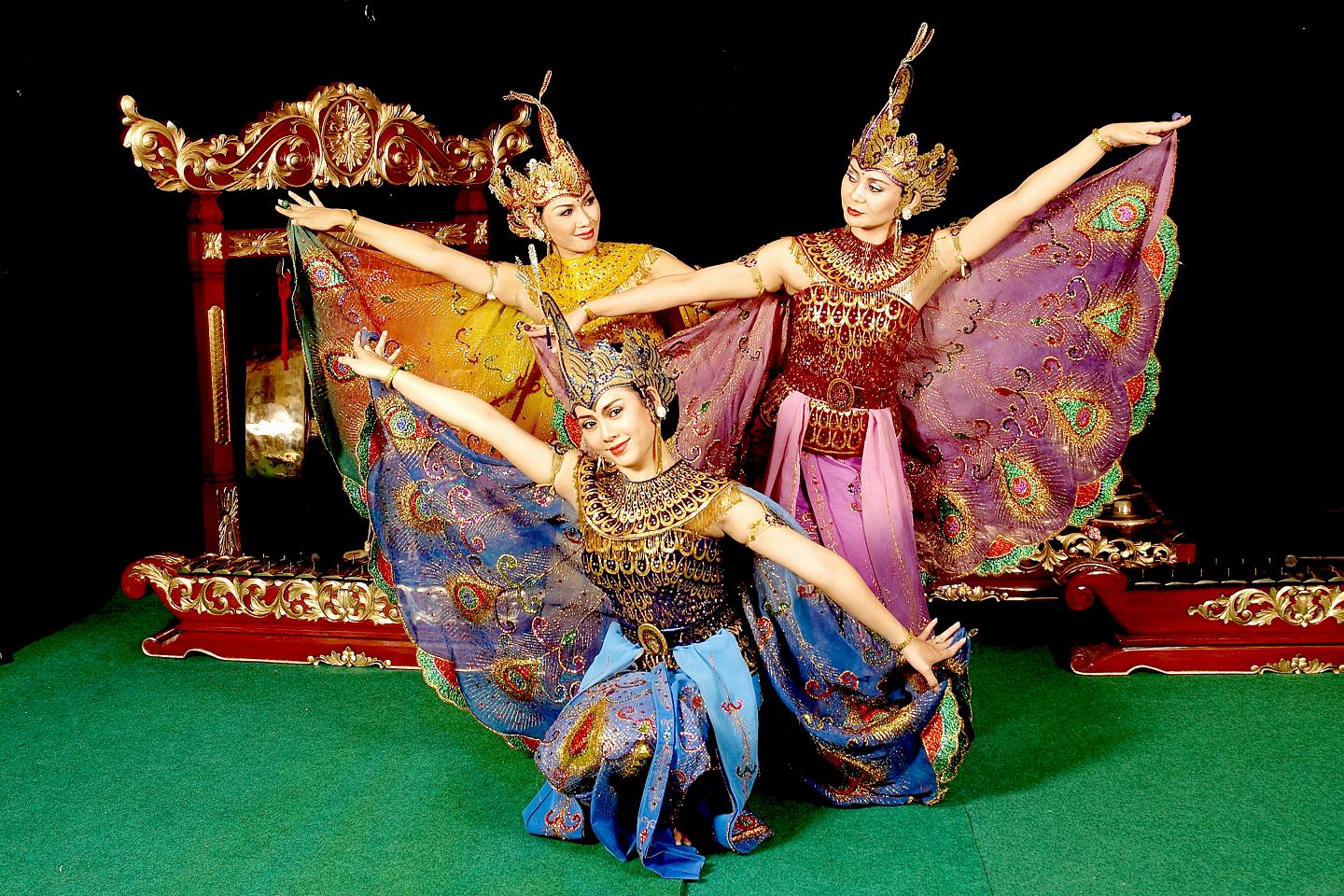
Le Serimpi, danse de cour javanaise Bali Authentique
Photos ofEiffel Tower and Javanese dancer as artifacts of the event; and more broadly, upon the connections they might signal between nineteenth-century Western notions of progress and the intensified framing of colonial cultures at a time of feverish empire- and nation-building.2 But for teachers, and more particularly students living
Regin's Travels Travel Photo of the Week Javanese Dancers
Javanese dance is the dances and art forms that were created and influenced by Javanese culture in Indonesia. Javanese dance movement is controlled, deliberate and refined. Javanese art often displays a finesse, and at the same time a serene composure which is elevated far above everything mundane. Javanese dance is usually associated with courtly, refined and sophisticated culture of the.

Javanese Dance editorial photo. Image of palace, mangkunegaran 33092656
Brataatmaja was the star palace dancer of the Surakarta Sultanate (Javanese monarchy in Indonesia), performing the royal court dance Bedhaya Ketawang for Indonesian royalty. Widyas Burnett, while.

1885 Indonesia » Javanese Dance Javanese, Culture, Dance
Javanese dance drama arose which was called in modern Javanese wayang wong, a maskless dance drama. The term wayang wong literally derives from the word wayang, which meant shadow or spirit and, today, play or drama, and the word wong meaning human being. Hence, wayang wong means a play performed by human beings.3

Modern Javanese Dance by Hannah Setu & Matriya Dewi at 3rd Coast 2015
Title: Javanese Dancer. Artist: John Singer Sargent (American, Florence 1856-1925 London) Date: 1889. Culture: American. Medium: Graphite on off-white wove paper. Dimensions: 12 11/16 x 9 11/16 in. (32.2 x 24.6 cm) Credit Line: Gift of Mrs. Francis Ormond, 1950. Accession Number: 50.130.109

Javanese Dancer IV Photograph by Cristian Juverdeanu Fine Art America
http://www.thewayofdance.com - The Way of Dance brings to life the art of ancient civilizations through classical and traditional dance forms, in the service.

Michael Freeman Photography Javanese dancer
Javanese dance (Indonesian: Tarian Jawa; Javanese: ꧋ꦠꦫꦶꦗꦮ, romanized: Beksan Jawa) is the dances and art forms that were created and influenced by Javanese culture in Indonesia.Javanese dance movement is controlled, deliberate and refined. Javanese art often displays a finesse, and at the same time a serene composure which is elevated far above everything mundane.

Woman Performing a Traditional Javanese Palace Dance at The Sultan's
Denishawn visited Java in 1926, as part of their world tour. They attended performances and actually studied, for the first time, under Javanese dance masters. A number of dances were created using Javanese motifs and materials, most famously the solo performance A Javanese court dancer (1926), based on the classical serimpi dance.

YogjakartaMt Bromo Adventure 2011 Traditional dance, Model, Culture
I grew up in a Javanese family that implementing ethical Javanese values and cultural practices, so I'm familiar with anything related to Javanese cultural traditions. My grandmother is an outstanding and skillful classical Javanese dancer, she has been the courtly Javanese palace (Keraton) dancer or usually called Beksan Putri since she was 11.

A young javanese dancer in traditional costume at the kings summer
The Javanese Court Dance At the present time our knowledge of the history of Javanese dance prior to the 16th century is very sketchy. Indeed, the former Mataram dynasty (9th cen-tury) left us the legacy of the great Barabudur, where one can have a glimpse of the dance of the past depicted on reliefs. The number of reliefs which depict

Javanese dancers Gamelan. Credit Pete Riley Music festival, Dancer
Courtly Javanese dance originated from the kratons, or palaces, of the sultans of Yogyakarta and Surakarta.Dances such as bedhaya and serimpi are associated with the refined, and sophisticated culture of the Javanese courts, where they embody the mythical creation of the monarchs and state and are an important symbol of a ruler's divine power. These dances are a discipline dedicated to the.

Javanese Dance web site 20100325391 Budaya, Indonesia, Beautiful
Watch as master Javanese dancers Urip Sri Maeny and Pamardi Tjiptopradonggo perform pieces from the classical court tradition of central Java, as well as a n.

Javanese Dancer Part of Indonesian Culture Stock Image Image of
NEW YORK, November 11, 2018 — In conjunction with a visit by Hamengkubuwono X, the Sultan of Yogyakarta in Indonesia, the musicians and dancers of the court.

Tidar Indah Javanese Dance [Central Java]
Her goals with Javanese dance "I would love to train more with Bu Rusini, the master teacher who trained me in Javanese classical dance, and also train more with Rianto in his art of the gender-crossing Javanese dance form called lengger. Rianto also taught me tari topeng (masked dance) and gagah, both of which are men's dances."

Javanese Dancer Showing Her Dancing Pose Stock Photo Image of
That is, there is an impact of Javanese dance on improving students' rhythmic skills and critical thinking (t = 6.575, p = 0.00 < 0.005). Conclusions. The applied Javanese dance has an impact on.

Rama & Shinta. Ramayana Ballet, a drama in typical Javanese dance
Javanese Dancers: Cultural Context of the Javanese Musical Ensemble and Dance The Movietone clip is made up of five shots: two extreme long shots of the dancers with the gamelan behind them (each shot counts as one take of the entire performance), one long shot of the dancers, one medium shot of the gamelan (with the bonang in the center), and.